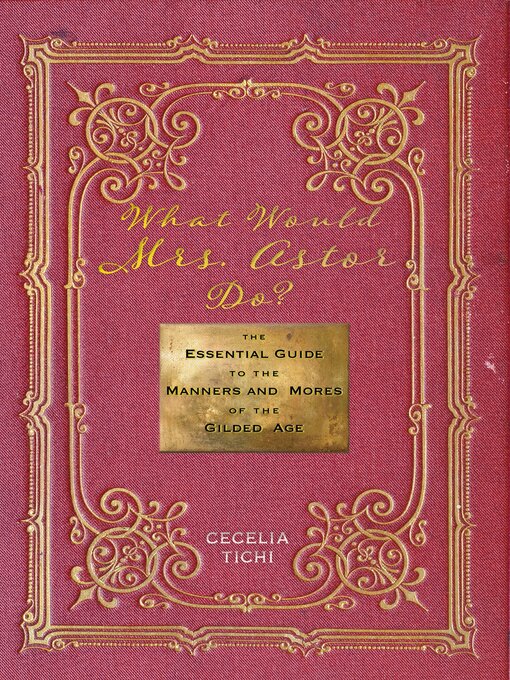A richly illustrated romp with America's Gilded Age leisure class—and those angling to join it
Mark Twain called it the Gilded Age. Between 1870 and 1900, the United States' population doubled, accompanied by an unparalleled industrial expansion, and an explosion of wealth unlike any the world had ever seen. America was the foremost nation of the world, and New York City was its beating heart. There, the richest and most influential—Thomas Edison, J. P. Morgan, Edith Wharton, the Vanderbilts, Andrew Carnegie, and more—became icons, whose comings and goings were breathlessly reported in the papers of Joseph Pulitzer and William Randolph Hearst. It was a time of abundance, but also bitter rivalries, in work and play. The Old Money titans found themselves besieged by a vanguard of New Money interlopers eager to gain entrée into their world of formal balls, debutante parties, opera boxes, sailing regattas, and summer gatherings at Newport. Into this morass of money and desire stepped Caroline Astor.
Mrs. Astor, an Old Money heiress of the first order, became convinced that she was uniquely qualified to uphold the manners and mores of Gilded Age America. Wherever she went, Mrs. Astor made her judgments, dictating proper behavior and demeanor, men's and women's codes of dress, acceptable patterns of speech and movements of the body, and what and when to eat and drink. The ladies and gentlemen of high society took note. "What would Mrs. Astor do?" became the question every social climber sought to answer. And an invitation to her annual ball was a golden ticket into the ranks of New York's upper crust. This work serves as a guide to manners as well as an insight to Mrs. Astor's personal diary and address book, showing everything from the perfect table setting to the array of outfits the elite wore at the time. Channeling the queen of the Gilded Age herself, Cecelia Tichi paints a portrait of New York's social elite, from the schools to which they sent their children, to their lavish mansions and even their reactions to the political and personal scandals of the day.
Ceceilia Tichi invites us on a beautifully illustrated tour of the Gilded Age, transporting readers to New York at its most fashionable. A colorful tapestry of fun facts and true tales, What Would Mrs. Astor Do? presents a vivid portrait of this remarkable time of social metamorphosis, starring Caroline Astor, the ultimate gatekeeper.
What Would Mrs. Astor Do?
The Essential Guide to the Manners and Mores of the Gilded Age
-
Creators
-
Series
-
Publisher
-
Release date
November 27, 2018 -
Formats
-
Kindle Book
- ISBN: 9781479827367
-
OverDrive Read
- ISBN: 9781479827367
-
EPUB ebook
- ISBN: 9781479827367
- File size: 6498 KB
-
-
Languages
- English
-
Reviews
-
Publisher's Weekly
August 27, 2018
Vanderbilt University professor Tichi (Jack London) delivers a crisp survey of New York’s upper-class world in the late 19th century, using society maven Caroline Astor as the guide. Tichi entices readers to “imagine themselves to be New Yorkers of a bygone era” who nevertheless bear a resemblance to today’s wealthy. The Gilded Age’s rigid social code provided stability during the tumultuous post–Civil War era, when new fortunes were made in rebuilding and expanding the country, creating new millionaires whom old-money New Yorkers found gauche and grasping. To stave off the infiltration of nouveau riches into established social circles in the 1870s, the wealthy Georgian Samuel Ward McAllister created a list of properly pedigreed Americans who comprised “society.” He persuaded Astor to serve as the ultimate arbiter of “the Four Hundred,” and the duo devised rules for proper behavior in everything from managing servants to choosing appropriate outfits. Tichi also delves into how the upper crust spent its time: on shopping, dining, traveling, entertainment, and various leisure activities. Astor’s presence is fleeting throughout, though her influence is unmistakable, especially in making divorce socially acceptable. Presented with a breezy authority that keeps the pages turning, Tichi’s book will captivate those interested in a light look at America’s fashionable gentry of eras past. Illus.
-
Formats
- Kindle Book
- OverDrive Read
- EPUB ebook
subjects
Languages
- English
Loading
Why is availability limited?
×Availability can change throughout the month based on the library's budget. You can still place a hold on the title, and your hold will be automatically filled as soon as the title is available again.
The Kindle Book format for this title is not supported on:
×Read-along ebook
×The OverDrive Read format of this ebook has professional narration that plays while you read in your browser. Learn more here.

